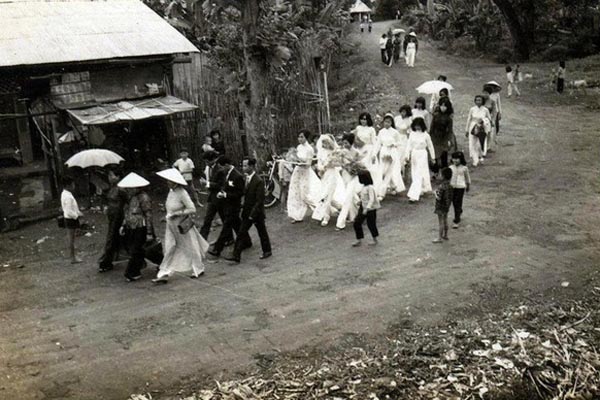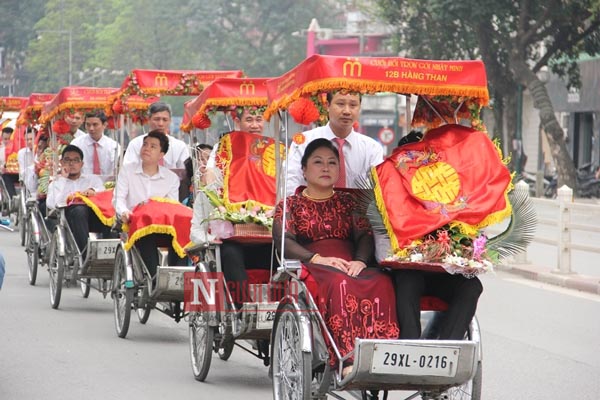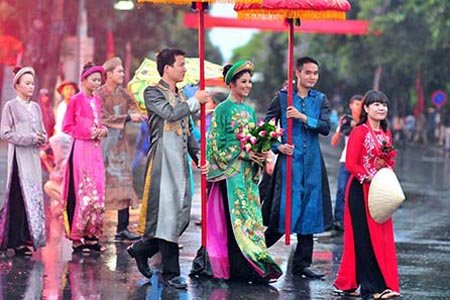Since the adoption of the market economy in 1986, there has been a marked improvement of the standard of living in Vietnam coupled with a deepening of the gap between rich and poor.
Economic successes have entailed, among other things, the revival of some outdated or wasteful customs and practices which were discarded as a result of social reforms undertaken by the 1945 revolution or simplified and pruned down in the course of thirty years of war.
On that subject, convincing evidence has been supplied by a probe into the celebration of weddings in Hanoi and its rural outskirts (Ha Noi Moi, 2, March 1997). Before the Revolution, the ritual of marriage could Unger for years and bring financial ruin to more than one family. Archaic rites were observed in the form prescribed by the Chinese Confucian scholar Zhu Xi (12th century).
Although simplified in Vietnam, they nonetheless included many operations: matchmaking, tallying of data concerning the hours and days of births of the bride and bridegroom, formal marriage demand, betrothal, ceremony in honor of the God of the Red Thread, visit the bride’s parents on the day following the marriage, payment of a fee to the village, etc.

For the betrothal, the bride's family required gifts for all members of the clan, its friends, and acquaintances. On the day of the wedding, a banquet had to be laid on for almost half the inhabitants of the hamlet.
That, without mentioning the practices introduced by snobs aping
Western etiquette in colonial times.
The 1945 revolution established the "new life" form for marriage ceremonies: in most cases, a meeting was held comprising parents, friends, and colleagues in the course of which the parents and especially representatives of the offices, factories, or co-operatives of the marriage partners reminded them "not to forget their duties to the country".
Since the restoration of peace, those meetings with civic inspiration have gradually disappeared, giving ground for a return to traditional rituals.
The results of the probe conducted by the Ha Noi Moi newspaper highlighted the combined effect of the old revived customs, the marked economy, and modern living.
Of the 400 families (living in the city proper) questioned March 1995,51.8 percent voiced their approval of the rite of tallying the Vietnamese zodiac signs governing the ages of the couple before betrothal; 93.3 percent supported the rites of betrothal; 11 percent the homage to the God of the Red Thread and 95 percent the homage to the ancestors.
The former "Wedding Tea" with pastry and cigarettes attended by a few dozen persons has now evolved into a true banquet, attended in "suburban villages by people of all the hamlets, in the city itself by the colleagues of the newlyweds, their relatives, friends, and acquaintances".
In certain cases, their number may swell to as many as 800-900. According to a survey conducted in ten urban and suburban districts, banquets attended by 600 guests and more are laid on by familied of ranking officials (58 percent) and traders (35 percent). The average family (State employee, peasant) invites three hundred people. Impecunious pensioners and workers invite relatively few people to their children's weddings.

The desire for pomp also marks weddings of children of ranking officials and prosperous merchants.
For the betrothal ceremony, there is a convoy of pedicabs with golden roofs carrying people bedecked with jewels and bearing many offerings. For the marriage, a video film is shot to show a motorcade with outriders, which often leads to traffic jams in Vietnam, all the more so as in the season of marriages there may be as many as 200-300 weddings per day in the city.
Such marriages marked by ostentation account for 86.1 percent in the four urban districts and 86 percent in the five suburban districts.
Banquets held on the occasion of weddings in plush restaurants are in return for invitations received previously in similar events and tend to be assessed in business terms. One takes care to invite by whom one has been previously invited.
The guest must abide by a tacit rule: he is expected to give his host a gift in cash (an envelope containing VND 50,000 - 100,000 or more - one-third or one-fourth of the monthly salary of the average State employee). It would be a real disaster for a man to receive three of four invitations in the same month - this is the opinion of 88.2 percent of the people questioned.
When the wedding is over, the host will draw a balance-sheet to see if he has made a profit or suffered a loss. Generally, it will show a profit, because he has taken care to invite as many guests a possible.



